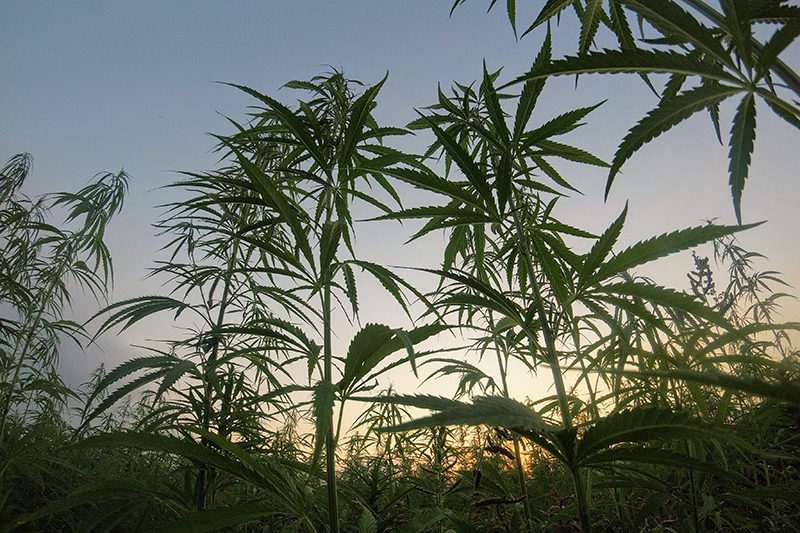Answering Five Questions Texans Have About Hemp and Marijuana
By Andrea Tinning
Reporting Texas

Image by Matteo Paganelli/Unsplash
Why can bars in Austin openly advertise CBD-infused drinks while a smoke shop in Duncanville is punished for selling CBD products?
After the Texas Department of Health Services removed hemp from the state’s list of controlled substances in April, the state’s cannabis laws sparked more confusion than clarity. To help readers see through the smoke, Reporting Texas found answers to five questions many Texans have about the legal situation of hemp and marijuana.
What’s the difference between CBD and THC?
Both tetrahydrocannabinol (THC) and cannabidiol (CBD) are found in cannabis plants. While each has 21 carbon atoms, 30 hydrogen atoms and 2 oxygen atoms, their molecular structures vary slightly, producing different reactions with receptors in the brain.
THC is responsible for the stereotypical mood and perceptual changes associated with marijuana, but CBD lacks this psychoactive capacity, according to the U.S. National Library of Medicine.
Marketers pitch CBD products for ailments ranging from chronic pain to anxiety attacks, but the FDA has approved only one CBD product and three products containing THC. Each is available only with a prescription. According to the FDA, selling any other food or cosmetic products containing CBD is illegal.
What’s the difference between cannabis, hemp and marijuana?
Cannabis is a plant family that includes hemp and marijuana, but hemp and marijuana vary in the appearance of their leaves and in levels of CBD and THC. Hemp contains less than 0.03 percent THC, while marijuana contains from 5 to 35 percent THC. Because of its THC makeup, marijuana is used almost exclusively for its psychoactive properties, while hemp has a variety of uses as an ingredient in products ranging from food to textiles.
The hemp plant itself is more hardy than marijuana, with a longer growth cycle and the ability to survive in more varied climates. Earlier this month, the Texas Department of State Health Services removed hemp from the state’s list of controlled substances, opening doors for the plant to be farmed commercially.
What’s legal in Texas?
Texas law defines hemp and marijuana as the same product, and the state has prohibited the possession and sale of both in most circumstances.
The U.S. Congress legalized hemp products containing less than 0.03 percent THC last year, but since Texas classifies hemp and marijuana as the same product, hemp remained illegal under state law. But in March, the Texas Department of Health and Human Services declassified hemp as a controlled substance. Now the Texas Legislature would only have to separate the definition of hemp and marijuana and adjust possession penalties accordingly to align with federal law and legalize hemp. The Legislature seems headed toward passing the Hemp Farming Act this session.
If cannabis products are illegal, why can I buy them in stores?
Law enforcement varies from city to city, and in many cases CBD and hemp products are not a top public safety concern, so the likelihood of local police raiding a CBD shop in Austin vs. a small town in the Panhandle may vary.
For example, Tarrant County District Attorney Sharen Wilson released a statement in February clarifying CBD oil products are illegal in the state except for epilepsy patients with a doctor’s prescription. A short time later, police began cracking down on local businesses.
How close is Texas to legalizing marijuana?
Closer than it’s ever been, but still not very close.
This year a record number of marijuana-related bills were introduced in the Legislature, according to Texans for Responsible Marijuana Policy; 17 focused on medicinal cannabis, 13 aimed at reducing penalties for possession, and nine dealt with CBD products.
On April 29, the Texas House approved House Bill 63, reducing the punishment for possession of one ounce or less of marijuana from incarceration to a $500 fine. The bill will now head to the Senate, where Lt. Gov. Dan Patrick has already expressed opposition to loosening the state’s possession penalty laws.
Texas has some of the strictest marijuana laws in the United States. Even under the Compassionate Use Act of 2015, medicinal marijuana became legal solely for the purpose of treating patients with intractable epilepsy. Prescriptions are available through an exclusive group of registered physicians, and there are only three licensed dispensaries in the state.